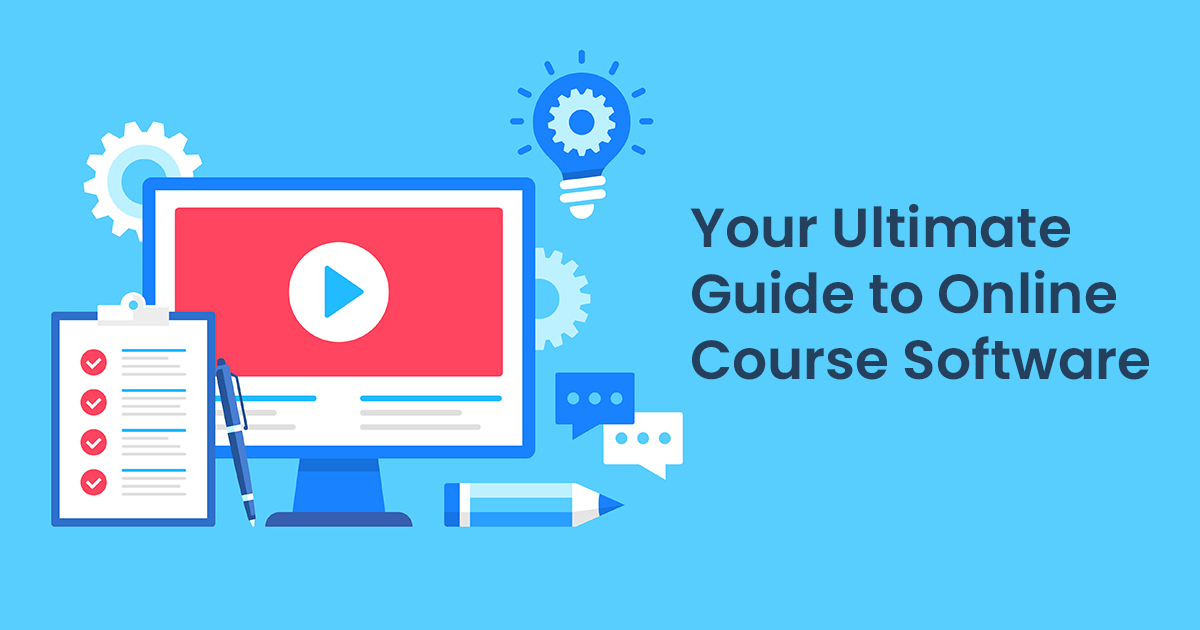 Are you overwhelmed by the number of coaching platforms out there? Looking for a way to make your online courses more engaging?
Are you overwhelmed by the number of coaching platforms out there? Looking for a way to make your online courses more engaging?
Selling a course can be difficult enough. You need a platform that allows you to focus on your clients and get excellent results. We’ve prepared this article to help you find the right software for your unique needs. SaaS, or software as a service, streamlines repetitive tasks and design processes, creating efficiencies that free up time and resources.
Our guide is easy to read and jam-packed with information that will help make choosing an online course platform a breeze. It doesn’t matter if you’re just starting to create and sell online, or are already running a successful business. We’ve got something for everyone!
What Is an Online Course Platform and Why Should You Use One?
An online course platform allows you to offer courses easily. It also lets you enroll students without all the hassle of complicated systems or tools.
You can create your own community where people can interact with each other and you. They can share knowledge, learn new things, and present their work in a live stream.
It’s usually differentiated from other platforms by its focus on education-related products. You can also use it to sell different types of digital products like software, games, images, and music.
With interest in online learning spiking, a good platform will make learning experiences better.
Companies spend millions each year finding out how to make their tools as user-friendly and intuitive as possible. That means that even beginners can teach online easily.
The Different Features of Platforms
There are several different features of online course platforms that you might want to investigate. Each has strengths and weaknesses so consider carefully before going ahead.
Most will help with building your course while others help keep your students engaged.
Courses Marketplace
An online course marketplace lets you upload your existing courses to their platform. They provide backend tools for uploading, tracking student enrollment, and so on. You can also create new courses using the vendor’s interface or use other formats like HTML5.
Landing Pages
A landing page is a type of website that is dedicated to a single product – in this case, the course. A well-designed and targeted course page will give you authority and credibility. It also paves the way for easy sales.
It should be designed with your potential students’ needs in mind so make sure you check it carefully before launching your new course. A well-designed landing page will include specific information about how people can benefit from your course, what they will get out of participating, testimonials from previous students, and any additional information that will help them be confident that taking your course is the right decision for them.
Course Website
A course website or membership site is a great way to create an online community around your courses. It is a centralized location for those taking the course to access everything they need to know. It allows you to provide information, behind-the-scenes content, live streams of lectures, Q&As, and more.
Students can take part in discussions with one another or contact you privately for personalized help.
Course Builder
Course builders are designed to make it easy for anybody to create online courses. They give you all the tools you need in one place, including automated marketing campaigns and email collection, so that your business can develop quickly.
With a course builder, you simply need to add your specific course content. Small businesses are often led by those wearing many hats. There is no need to feel overwhelmed or reinvent the wheel when companies offer easy to use polished solutions to what can feel like complicated technical problems.
Lectures
This is the most basic of course features, allowing you to upload videos and set them out in an easy-to-follow series. The downside of using lecture mode is that it’s rather linear. There’s no way for your students to ask questions without you noticing unless you’re watching the video yourself!
Lecture screens are usually accompanied by a chatbox. This lets people interact with each other (or with you) but this feature means that your screen is full of distractions.
Live Stream
Live stream allows users to host presentations on different topics or elements of your products; this can be particularly useful if you have experts who want to do webinars or seminars with their own followers. Live streams are interactive, allowing you and your team to react in real time to questions or prompts from your students. The students feel more connected to the experience. Live streams feel like an event with opportunities to be connected to others at the same point on the learning journey. Live streams can also act as touchstones for coursework delivered at the end users’ pace. Including livestreams in your coursework mix can provide a touchstone and evaluative moment for instructors.
Screen Capture
Screen Capture is perfect for things like instructional videos or tutorials, allowing you to capture your screen (and webcam) and upload it as part of your course material. Again, this is great for people who want to show students how something works by demonstrating it first-hand but can also be used as a more interactive form of lecture video where students can see the material being worked on as the instructor does it. Combining screen captures with live streams or lectures can allow students to revisit topics they may have had difficulty grasping or piqued their interest for a deeper dive.
LMS (Learning Management System)
A Learning Management System is an add-on that allows students to access their courses whenever they want, not just when you’re online. This means they don’t need to keep returning to the site to complete their studies.
They can do everything from their phone or tablet while traveling, commuting, etc., making them more likely to finish all of their lessons. The pandemic and great resignation uncovered a need for meeting students where they are. With increased parental responsibilities and a fluctuating job market, ease of access for coursework is a huge sales proposition.
Hosted vs Self-hosted
Hosted solutions run on the company’s servers and don’t need any type of installation or technical knowledge from your end, while self-hosted ones have to be downloaded, installed, and set up on your website before they can take effect.
Some hosted platforms will allow coaches to do a certain level of customization but most do not offer this option for security reasons. You will also need a way to get training if you choose this route. It’s important to factor in the cost of ongoing support as well.
[bctt tweet=”When considering a platform, it is crucial to think about how easy it will be to work with the software, especially if you have a technical person on hand or are just starting out.”]
Discussion Forums
Discussion forums play an important role in online courses because they help clients connect with one another and find answers to their questions, making this type of platform an integral part of community-based learning systems.
The most popular providers offer tools for creating discussions within your course materials since they know that’s what customers want – but some companies may not offer this option at all.
Ecommerce Options
A third major category is eCommerce functionality, usually allowing you to sell online courses from your store directly so you can generate more revenue from the same amount of effort.
In this case, you’ll need a platform that has a built-in shopping cart or at least allows for integration with popular payment gateways like PayPal and Amazon Payments to process transactions automatically. This option is especially useful if you want to turn your online course business into a full-fledged online product site but don’t have the technical know-how necessary to set it up on your own.
Certificates and Badges
The final category we’ll look at is certificates and badges, which allow students to showcase their accomplishments online in a way that positions them as experts in their chosen subject matter.
Almost all providers now offer this type of functionality as standard since it’s fast becoming an industry standard. Make sure they offer the types of qualifications you need before signing up because some only cover general courses while others may focus on certifying tech skills.
Consider the Cost
Online course platforms charge different rates for monthly and transaction fees depending on what features you need and what plan or level you choose (some don’t even have monthly fees). Your business cost projections should include scalability, ease of use and efficiencies, as well as IT infrastructure. Remember that based on your choice of hosting options, you may see a greater cost per month, however this is offset by savings in tech hardware and storage solutions at your place of business. Scalability is important as you grow your business. Your online course software will grow with you.
Types of Courses
Platforms use different methods to set their prices, with some offering customizable plans that give you full control over what features you pay for. Others provide pre-set packages depending on the type of course you want to create.
In either case, it’s important to ask what you get for your money before making a decision – do the extra expenses add up quickly? Will they be worth it if they help generate more revenue from digital sales?
Package Flexibility
It’s also possible to upgrade your platform over time if you want access to extra features beyond the basic plan. Make sure it’s easy enough for a non-technical person to get started. This will give you more freedom to learn and explore.
In other words, think about how quickly you can get your business up and running without spending too much money on software. Price is a major factor when starting out, especially if you need help from a technical person at some point.
Questions To Ask Before You Choose
There are a few basic questions you should be asking before you sign up. They may seem obvious in hindsight but forgetting about them could be costly.
What Kind of Online Course Business Do You Want To Create?
This is a pretty basic question, but many people fail to think about it or answer it before they sign up for an online course platform. Do you want to focus mainly on sales or do you want to have a more content-based business?
How Much Control Do You Need?
Before signing up with any online course software, be sure that the platform has all the functionality you need and doesn’t limit what you can do. Some tools make it easier to track everything from your back end, while others may only offer limited features.
How Will You Administer Exams?
If you plan to give students access to your course material for a certain period of time, make sure you can set different due dates.
Otherwise, this might pose problems when it comes to administering tests and grading them on time if they all close at once.
Some providers also let students retake the exam as many times as they want before closing out.
Do You Need Help With Online Marketing?
Make sure the platform of your choice has some support for marketing tools. This can help increase student engagement and boost enrollment numbers.
Of course, you could do this yourself but there’s a lot to be aware of. For example, did you know that women are showing record enrolment in online certification courses?
Additionally, be sure to check whether it integrates with email services (e.g., AWeber) as well as payment providers (e.g., Paypal). Online sales take active work so anything you can do to get your marketing working properly is a great idea. Aside from that, proper marketing makes your courses appear more professional.
Are There Any Other Features You Want?
Take a look at what each provider offers on their website before signing up; some tools come with more extras than others, such as live webinar recording and live chat functions that let students ask questions.
How Much Support is There?
Check what level of support they offer before signing up; most providers have many levels based on the size of your package. Some only give limited email support while others offer round-the-clock help. This is usually through phone or ticketing systems with higher packages.
If you plan to scale your online course business quickly, choose a platform with 24/7 live chat support.
What Will You Need To Integrate?
Plugins can help you add third-party software to an online course platform so it performs specific tasks. For example, if you plan to use a payment provider like PayPal for accepting payments, check whether the platform has a plugin that lets you integrate both services.
Are There Testimonials From Other Users?
Take a look at what current and former users have to say about the platform of your choice before signing up. This lets you get an idea of how well it performs in real-world situations so you know whether it’s right for your online course business.
The Right Platform to Sell a Course
Online course platforms allow you to create courses with no coding knowledge, and most come with a wide range of features. But, it can be difficult to find the one that is perfect for your coaching business. Before signing up, take a look at what each provider offers on their website.
If this sounds intimidating and overwhelming or if you want more information about how we can help you craft an online course strategy, let us know!
Ready to Get Started?
Now that you have a clearer idea of what you need in the right online course software to support your coaching business, you’re ready to try out some different options.
Coaching Genie offers a 14-day free trial to give you an opportunity to experience how the platform can benefit both coaches and coaches.

Milana Leshinsky is the author of “Coaching Millions” and “Simplicity Entrepreneurship” and the originator of telesummit. She is also the creator of Coaching Genie, a coaching platform that allows you to deliver coaching programs and scale your business with simplicity. She’s passionate about helping coaches, authors, and speakers leverage their expertise through creating programs and overcoming fear of technology. Milana came to the US as a music teacher from Ukraine almost 30 years ago. When she’s not working on her business, Milana writes music and enjoys Latin ballroom dancing. To learn more, visit Milana’s website at https://CoachingGenie.com

